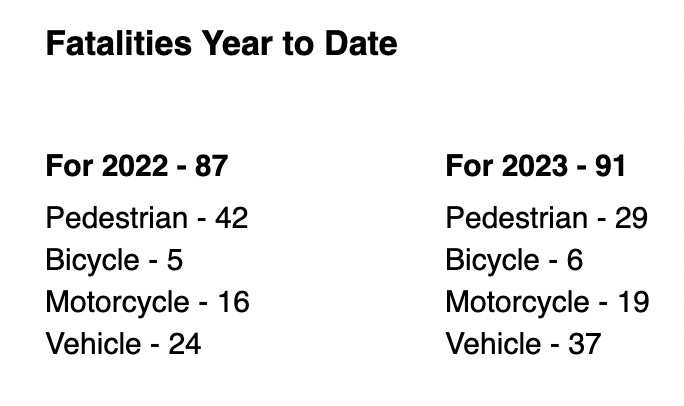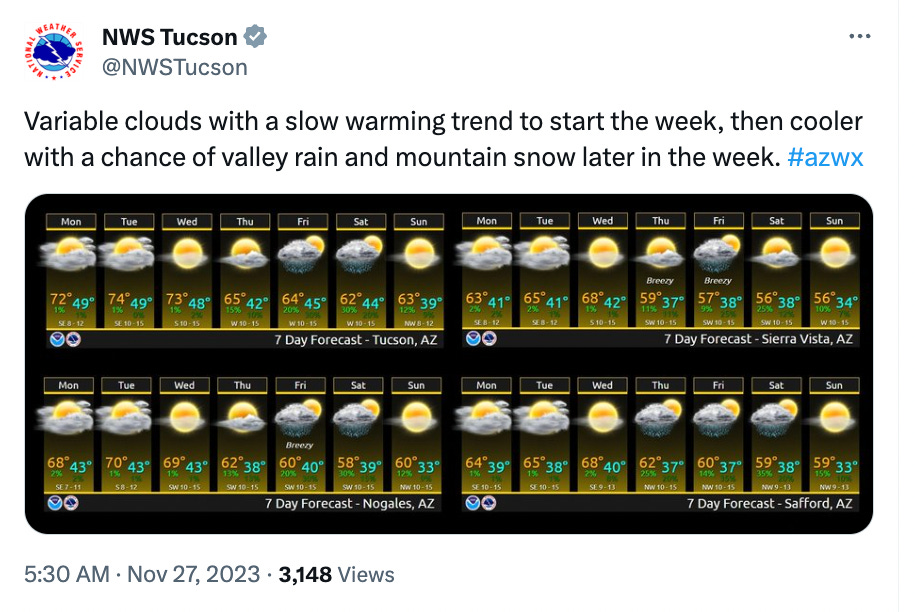The Daily Agenda: We have big plans!
The Tucson Agenda is growing again … But our ability to be the kinds of employers we want to be depends on your support … Street racing solutions are in the works.
It’s Giving Tuesday, a global generosity movement that offers people the chance to make an impact in their communities and around the world.
We hope you’ll consider giving to the Tucson Agenda this year, but we know you work hard for your money, so we want to explain why donating to us is a good investment that can benefit the community at large.
The media landscape is changing fast. Journalism jobs disappear every day and communities around the country lose access to the valuable news and information they need to vote and make other informed decisions about their everyday lives.
We’re proud to be a part of the movement to grow comprehensive, independent local news coverage in Southern Arizona, and we’re in fine company with Tucson’s other locally-owned outlets, like the Tucson Sentinel and Arizona Luminaria.
For the past five months, Caitlin and Curt have been working hard to bring you a newsletter five days a week (with the exception of holidays) and while we’ve told you how much fun we’re having, we probably haven’t told you enough how incredibly grateful we are that your support has allowed us to do this kind of work.
But we want to do more coverage in more formats. One of the phrases Caitlin hears all the time when reporting on solutions is that it’s important to meet people where they are, and that certainly applies to the news.
Last week, we told you about our fundraising campaign to make politics and government more accessible by providing content in different formats, including podcasts, videos and social media.
We know most people — and especially younger people — get their news through social media, so we want to bring quality and comprehensive news to their feeds.
Through the end of the year, you can make a tax-deductible donation through our partners at the nonprofit Local Media Foundation, which lets independent and family-owned news outlets solicit tax-deductible donations from the community.
Our goal is to hire a part-time digital storyteller who can help us take the stories we write for the newsletter and make them digital. And we have some other big plans for the new year that will allow us to increase our coverage and bring even more diverse voices to the Agenda.
In a few weeks, we’ll introduce you to our two University of Arizona public affairs reporting fellows who will start in January and be paid for their work, thanks to the journalism school’s newly created Jamieson-Metcalf Family Scholarship.
The student reporters will follow government bodies that often go undercovered, including Oro Valley, Marana, South Tucson and some of Pima County’s smaller school districts.
Both students have experience covering local government and excelled in Caitlin’s public affairs reporting class. We’re excited to introduce you to our newest team members, but more important than that, they’re excited to share their work with our readers and the community.
We also interviewed several talented students at the journalism school’s internship fair last month, so in addition to our two reporting fellows, we’ll also be bringing on an intern with experience reporting in multiple formats and an amazing on-camera presence.
She’ll be joining us as our first social media and multimedia intern, which will allow us to expand our footprint and reach on social media and introduce subscribers to different types of storytelling (we can’t wait to get started on TikTok.)
But we still don’t have quite enough funding to pay interns on our own and there’s no school-sponsored scholarship to help us do that with this position. That means our ability to pay her depends on our subscribers and the community, which is why we hope you’ll consider supporting us on Giving Tuesday.
Both Caitlin and Curt have done unpaid internships and that’s not a system we want to perpetuate if we can avoid it. We want to be a place for students to showcase their work and let their voices be heard, but just like professional journalists, we believe they deserve to be paid for their efforts.
The more people we have reporting and producing content for the Agenda, the better informed the community will be. And we want to make sure we’re doing as much as we can to help uphold democracy and give citizens the information they need to make informed decisions and live their best lives.
Financial crisis update: UA President Robert C. Robbins committed to not imposing furloughs or cutting retiree benefits to help mitigate the school’s financial crisis in a Wednesday email to faculty and staff, the Arizona Daily Star’s Ellie Wolfe reports. Robbins also said he wouldn’t reduce need-based financial aid for students and would protect the school’s teaching and research mission. He said that any decisions about financial aid would only affect students receiving merit-based scholarships and that any potential changes won’t affect current or accepted students.
Safer streets: The Tucson City Council will hear during today’s meeting about new technology that can be used to target illegal street racing, KVOA’s Conor McGill reports. Council member Nikki Lee complained last month about the increase in racing activity in various parts of Tucson. Some of the technology they’re considering includes cameras that can cover large areas while tracking specific items, a gunshot detection system and automated license plate readers to capture all plates that come into its view. The cost of these range from $125,000 to $300,000.

Changing the system: Tucson native Benjamin Taylor, president of the State Bar of Arizona, sat down with the Arizona Republic’s Elvia Díaz for the latest episode of the Republic’s video series “AZ I See it” to talk about what it means to be the first Black lawyer to hold his position. Taylor drew national attention when he defended a woman who was wrongfully arrested in Scottsdale for a hit-and-run and who later won a lawsuit against the city. He hopes to use his position to fight for fair and equal treatment for all.
Housing horror stories: El Inde Arizona’s Catherine Hill interviewed three UA students impacted by the housing crisis, whose experiences included significant rent increases, hidden fees and a lack of institutional support. While the UA doesn’t have a system to support students facing housing challenges, it’s aiming to launch the Dorm Stipend Fund, a donation-based grant that would be available for students in the fall of 2025. The UA says the grant is meant to “help low-income and/ or first-generation students do better in school and graduate faster,” with the fund covering anywhere from half to 100% of the cost of on-campus housing.
Gifting from the heart: If you’re looking to shop with purpose this holiday season, This is Tucson’s Elvia Verdugo has compiled a list of 10 gift shops that are run by nonprofits that give back to the community. Stores include Ben’s Bells, Native Seeds/SEARCH and the United Nations Association of Southern Arizona Center, but in addition to the shops on the list, Verdugo writes that many thrift shops and secondhand stores also give back to the community.
Not your ordinary vet: A new emergency veterinary hospital has opened in Oro Valley, with operators saying they’re revolutionizing the way pets are cared for, KOLD’s Jack Cooper reports. This is the Emergency Veterinarian Group’s third location in the state and it offers service 24 hours a day, 365 days a year. The hospital has an open floor concept, with pets getting checked out as they come in, and pull-out mattresses available for owners who want to stay on-site for an extended period of time.
Residents railroaded: Conservationists and residents of Ímuris, Sonora are protesting the Mexican government’s cagey plan to run a freight-train line through a fragile conservation area without conducting an environmental review, the Star’s Emily Bregel writes. Residents of the community, which is located about 40 miles south of the U.S.-Mexico border, have submitted an alternate route for the train project that would bypass the El Arbabi Conservation area, which is home to jaguars, ocelots and black bears.
39: Sunday’s forecasted low temperature for Tucson. With even cooler temperatures on the horizon, get ready to cover those plants!










